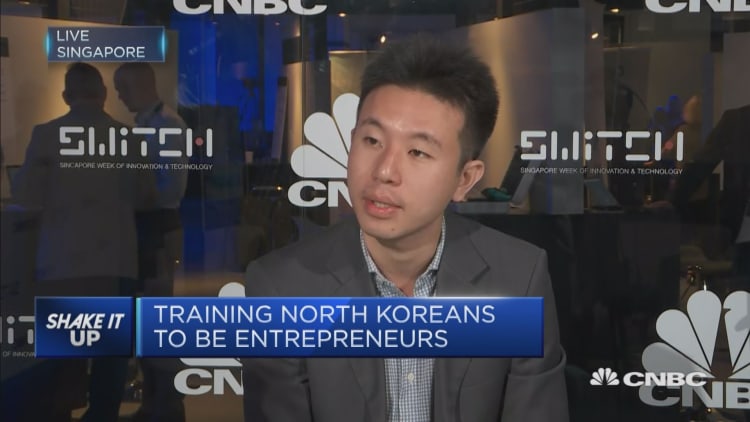
Entrepreneurial spirit and innovation aren't exactly synonymous with North Korea. But, former Bain & Company consultant Geoffrey See has bet on the reclusive country's business potential for nearly a decade. And he says changes are finally starting to take hold.
"I think the last five years have become a much more stable environment," See said. "There's a bit of a mind set change in terms of how (North Koreans) approach their business, and the kind of risks they're willing to take with those businesses."
See has been teaching North Koreans the basics of business and economics, through his non-profit group Choson Exchange. Launched in 2010, the Singapore-based organization has trained more than 1,600 North Koreans to date, with the help of outside volunteers who regularly host workshops in the country, from Pyongyang to Rason.
See and his group conduct courses focused on three key themes: women in business, provincial development and entrepreneurship among younger business leaders. Participants are chosen through an application process, in partnership with North Korean universities.
While See said the program is largely free of any government control, he and volunteers are careful not to incorporate the concept of capitalism in any of their lectures.
"Very often when we look at the news, the focus is on the nuclear programs, and on the military and I think people tend to forget that there's 22 to 25 million other North Koreans," See said. "Many of them, have pretty ordinary lives. They're trying to make a living through entrepreneurship and business. They want to be more integrated with the rest of the world."
Continued provocations by North Korean leader Kim Jong Un, and nuclear weapons tests in the face of United Nations sanctions have done more to isolate the country than integrate it into the international community. Still, See said technological advancements domestically, and exposure to Chinese tech companies have shifted the business interest from trade to retail and e-commerce.
Since launching its 3G service in 2008, more than 3 million people have signed on to North Korea's official mobile phone network Koryolink, according to Reuters, enhancing digital literacy. While North Korean citizens are only limited to using a domestic intranet strictly controlled by the government, See said Choson Exchange participants are increasingly utilizing mobile phones, in the same way their western counterparts do.
"A lot of North Koreans who have been to China for trade or to visit family will often come back and bring up examples of things they've seen like WeChat, or Taobao and say oh, we are very interested to see if we can do something like this in North Korea," See said. "We've seen some food delivery apps pop up on the domestic phone."
See acknowledges there are no metrics to gauge how much such a service is being used, or just how high mobile penetration is, but the observations point to clear developments within parts of the North Korean economy over the seven years Choson Exchange has maintained its presence there.
I think people tend to forget that there's 22 to 25 million other North Koreans. Many of them, have pretty ordinary lives.Geoffrey SeeChoson Exchange founder
For example, See said, roughly half a dozen "Craigslist-like" e-commerce sites have been developed by his students this year alone. A participant in his "Women in Business" program also recently started a "Facebook for Moms."
Compare that to See's first trip to Pyongyang in 2007, when mobile phones were non-existent.
"The hair styles, the color, the trains, everything to me felt like traveling back in time to the Soviet Union or something," he said. "They had these phones at every restaurant and the tour guides had to pick up the phone, call the place of the next location we were getting to, making sure everything was running on time."
Recent data from the Bank of Korea says North Korea's economy grew at its fastest pace in 17 years last year, though the country's per capita gross national income is just 1.5 million won, or less than 5 percent of South Korea's figure. Still, for all the developments See has witnessed over his decade of traveling to the isolated country, he said the most common questions he gets remain the most basic.
"We get a lot of questions about what a stock exchange is — what do they do, what are they like," See said. "We always have to tell them you are 20 to 30 years from setting up one. It's not something that's useful right away."


